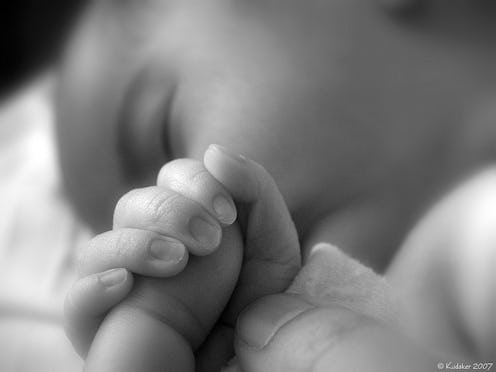News
"Digital Kidnapping" Will Make Your Skin Crawl

Just when you thought the internet couldn't get any creepier. There is apparently a disturbing trend going on called "digital kidnapping." And if that phrase is new to you, allow me to fully weird you out some more. "Digital kidnapping" is when someone steals a stranger's baby photos and reposts them across the Internet. Sometimes, these virtual photo thieves will pass the snapshots off as their own. But other times, it goes one step further. On Instagram, for example, accounts are being set up specifically to encourage others to join in on "adoption role playing," inventing new identities for each child and inviting users to chime in.
I'll freely admit that I had never heard about this before this morning. But after poking around Instagram for all of 10 minutes, I am officially sick to my stomach. While the bios on these accounts claim them to be "harmless," I quickly saw for myself just how often they go to disturbingly dark places. Hashtags like #adoptionrp, #orphanrp, and #babyrp yield thousands of results, featuring photos of babies and toddlers, all without their parents' knowledge. Click into them at random, and you'll see many photos feature captions fictionalizing the lives of each child — who, by the way, the poster has presumably never even met. "Name: Tommy," reads one caption alongside a smiling baby. And then it gets weirder: "Loves: mommy, milk, being nakey, sucking items." (*shudder*)
Scroll through the comments further, and you'll soon wish you'd never even wandered into this sick virtual world — which Fast Company has dubbed "the creepiest new corner of Instagram." Some commenters begin rather benignly, with things like "Hi, baby!" and "Hi cutie!" But they often quickly spiral into a truly uncomfortable — and inappropriate — mode of banter. So much so that I honestly had to stop reading a few of them.
The fact that some actually use these photos to act out bizarre sexual fantasies is probably the most alarming, stomach-turning part of it all — especially for parents who may be used to regularly posting their smiling kid pics all over Facebook or Instagram without worry. But as Caroline Knorr, parenting editor of Common Sense Media, told Cosmo, "Once you upload a photo it really is out of your hands, and that is the sort of scary reality that many parents are facing and being victimized by."
The fact is, there's not exactly anyone out there policing these accounts. While Instagram will follow up reports on accounts and individual photos, it's up to users to report them in the first place. There are, however, some lone wolves out there who have taken it upon themselves to step in. (For example, the user nomnomnom.lolz was a frequent commenter on the photos I perused, writing things like: "You sick f*ck, these are real babies that DONT BELONG TO YOU. Piece of sh*t.")
Part of the problem with policing these accounts is that these users aren't technically doing anything illegal — not from the onset, at least. There are currently no laws prohibiting photos from being repurposed on Instagram (hence our current #repost ability). The only way around this — which you should do immediately if you're concerned about this — is to set your own photos to private. Limiting who views your photos to pre-approved followers will at least cut back on the likelihood that they'll be stolen.
Gary Davis, Intel Security's chief consumer safety evangelist, also told Cosmo that downloading a simple smartphone app can allow you to watermark your photos, and even put a small message on them stating the child is yours. "That would demotivate somebody from trying to use them," he said, noting that the main attraction of these adoption role players seems to be the child's anonymity.
There's also the upsetting reality that photos posted on social media could lead to some real-world kidnapping, too. To skirt that possibility, Davis suggests parents only post photos that have no obvious signs of location in them. Avoid geotagging photos, as well, to further ensure that strangers can't figure out your child's location.
There are plenty of parents learning about this trend the hard way every day. Just take Texas mom Danica Patterson, who recently discovered that photos of her four-year-old daughter had been stolen by a man in New York, who posted them to his own Facebook page. The posts included such descriptions as, "Y'all can’t say ma daughter not ma twin," and, "Ma daughter gunna break y’all sons hearts …"
It's hard not to read all of this and not be A) completely disgusted and B) reminded of a slew of other stories in which Instagram stepped in over comparatively harmless photos. Case in point: You may recall the controversy that swirled last year after British blogger Courtney Adamo had her IG account deleted over photos of her toddler that were deemed too provocative. In truth, there were a few cute shots of her daughter innocently looking at her belly, as kids do.
But Adamo's story is hardly unique. Instagram has landed itself in hot water before for deleting breastfeeding photos, underwear photos, and other not-so-scandalous images. As recently as April of this year, the site was once again moved to revamp its guidelines in response to outcry. I think it's safe to say that, given the threat digital kidnapping and adoption role play currently pose (and the fact that the trend has been growing for several years now), it's clear how badly those guidelines need to be revisited. In the meantime, at least parents can make themselves aware of what's out there, and take comfort in knowing there are measures to take to minimize the chances of it happening to them.